And Never Let Her Go: Thomas Capano: The Deadly Seducer Read online
Page 5
While her five siblings were old enough to work, Anne Marie was not. Providing her with clothing and food was “haphazard,” according to Brian. “We tried to look out for each other as best we could. It was complicated. We couldn’t go and ask the neighbors for food or money, so we just tried to get by as best we could. We all just sort of hung in there together.”
Most teenagers responsible for a nine-year-old could not have managed as well, but all of the Faheys were bright and resourceful, and devoted to family. In time the older brothers and Kathleen moved out, managing to attend college on grants and scholarships, until finally just Brian and Anne Marie were still living with their father. And when he was drunk, they stayed away from him. Anne Marie lost herself in books when she was sick and home from school. Sometimes she wasn’t sick but didn’t want to go to school, so she hid in the closet.
As young as she was, Anne Marie had a fierce pride. She never wanted anyone to feel sorry for her because she didn’t have a mother, or a nice house or new clothes. She developed a persona that hid her insecurities and her sorrows; her laugh boomed louder than ever, and she was clever and full of mischief when she was with her friends. But she always went to their homes, because the Fahey children had long understood they couldn’t bring friends home.
Anne Marie’s home life was unpredictable, to say the least. And like all children of alcoholics, she and her siblings had come to fear their father’s sudden outbursts of temper. They learned to absorb his words without really listening or simply to block out his rages, but they didn’t want to have their friends know how bad things were.
Sometimes their house was cold because the electricity had been turned off again when the bill wasn’t paid. Their father had used the social security checks to buy liquor instead. When there were no lights at home, they would study at friends’ homes or at the library. There was often no hot water, and sometimes no water at all, a situation that would last for many months at a time. Once, the Faheys’ telephone was cut off for an entire year. Anne Marie took her hot showers at school after gym class, and never told her friends that it was the only way she could take a shower. She went to tremendous lengths to appear to be just like the other girls her age. She could not bear to be pitied.
Anne Marie had love—from her siblings, her grandmother Nan, and a few other relatives—but she had little else. Her clothes came through hand-me-downs and a few Christmas presents. Even putting food on their table was problematic for the Fahey children, but somehow they managed. After they were grown, they sometimes wondered how they had done it—but something or someone always came through with clothes or food or a little money.
And they were all workers, just as their grandmother had taught them to be. Everybody but Annie worked at one time or another in the Freel’s tavern, O’Friel’s Irish Pub. On a busy Saturday night, Robert might be tending bar upstairs, and Brian was the bartender downstairs. Kathleen worked at O’Friel’s for nine years. Kevin, the tall redheaded Freel brother, used to tease Anne Marie, “We’ll get you one day, too, Annie. Don’t think you’ll get away from us!”
She would laugh and say, “I don’t work for you, Kevvy.” She loved Kevin, and Bud and Ed and Beatrice. And they loved little Annie. She was too young to work then, only in school at Springer Junior High. Even so, she wanted a more exciting job than as a waitress. She had wonderful dreams for her future, and her dreams helped her make it through the present.
When Anne Marie was in the seventh grade, Robert Fahey married again. His new wife, Sylvia Bachmurski, had a son and a daughter by an earlier marriage. And so, in 1980, Anne Marie had a stepmother, and far from resenting her, she was delighted. It was comforting to have a grown woman in the house looking after things, and Anne Marie was so happy when she saw their dining room table covered with a white tablecloth and set with nice dishes and candles. It had been so long since they had eaten at a pleasant table the way other people did.
But her father’s second marriage lasted only a few months. Sylvia had believed that Robert Fahey was working, and it was a terrible jolt when she found out he had lied. Too late, she realized that he was a practicing alcoholic and that she had walked all unaware into the chaos and deprivation his children had known for the last few years. She really cared about Brian and Annie, but Sylvia knew she couldn’t stay once she found out how things really were. She pulled Annie and Brian aside one day and said, “I’m so sorry—but we’re leaving. We just can’t stay.”
Anne Marie was so sad. Sylvia had assured her she could call to talk, and she did a few times. But she knew Sylvia wouldn’t be coming back. The house quickly reverted to the way it had been, with everyone eating wherever they felt like eating, and no more pretty tables or flowers or candles.
In a vain attempt to change her father’s downward spiral, Anne Marie hid his bottles and poured his drinks down the drain. She dreaded the sight of him sitting on a chair in the kitchen, drinking the evenings away. She would hide in her room until she heard him stumble off to bed. Her friend Beth Barnes later summed up Anne Marie’s ordeal. “Annie’s had the shittiest life,” she said. “A lot of people who had what she had would fold, but she was strong.”
ANNE MARIE could talk to her grandmother and drew a great deal of comfort from that relationship. Later she would write, “She was the most reliable, stable, sober adult person in my life.”
She had needed someone like that desperately. She had lost her mother, and her father underwent a complete personality change when he was drunk. Anne Marie was the one who bore the brunt of the rage that swept over him, although both she and Kathleen had come to loathe and fear the man their father became when he was drinking. There was no explaining why he chose Annie to be his verbal punching bag. She was, perhaps, a reminder that he still had responsibilities and he could not simply abandon his life. She was the most vulnerable of his children, and yet she was feisty, too. Although she told herself that the man who shouted insults and obscenities at her wasn’t her real father, his words did more damage than a physical blow could. He told her she was fat, that her legs were fat, that she was ugly, that no one would ever want such a fat, ugly girl for a wife. Sometimes he called her a slut. Terrible words that evoked terrible feelings.
Sometimes, caught unaware when she heard the front door open and the heavy steps that meant her father was drunk, Anne Marie escaped his vitriol by scrambling under the dining room table to hide. She made herself as small as possible, repeating Hail Marys in her head, praying he wouldn’t find her. But he usually did, leaning over and shouting cruel words at her. Her fear as she hid under the furniture may have been the cause of her lifelong claustrophobia. For whatever reason, Ann Marie would grow up with an almost pathological fear of the dark and of closed-in places.
As she grew older and more able to fight back, Anne Marie fended her father off with her hockey stick. She poked it at him, keeping him at bay, threatening to strike him if he didn’t go away. Occasionally she got so frustrated and angry with her father that she erupted, totally beyond fear. “If I remember correctly,” Kathleen said later, “my father used to take Anne Marie’s change, and she got tired of it and chased him around the house with a field hockey stick.”
Why Robert Fahey told Annie she was fat and ugly is part of the mystery of the human brain on alcohol. She was neither fat nor ugly. She was growing into a tall, willowy, and transcendentally beautiful young woman. Despite living in an almost Oliver Twistian situation, she was a talented and bright girl, lovely as a flower, with friends, good grades, and hopes for the future. She wore that happy mask when she was at school. All the hurts and pain were hidden behind her laughing facade. She never spoke of the mother she had lost or of how she still grieved for her. She certainly never talked about the father who was as lost to her as her mother was. But at times she saw glimpses of the man her father had been, and in a way, that was even more painful.
AT Brandywine High School, Anne Marie turned in her homework promptly, excelled at sports, and
went home to a house that continued to disintegrate. Her sister and all of her brothers except Brian had moved out. Separated physically, they grew closer emotionally, while Annie, still living with her father on Nichols Avenue, used up a great deal of energy being afraid and looking for safe niches where she could hide. But even so, at the very center of her, there was a little kernel of self-esteem that would not die. Blighted as it was, the essence of Anne Marie Fahey would not give up. When Brian was home or whenever her other siblings came over, they stood between their Annie and her father’s fury. When they weren’t there, she managed to survive on her own.
Brian was a freshman in college when the inevitable happened and there was no house for them to live in. It had been in the process of foreclosure for a long time and went up for a sheriff’s sale in 1980. Their father had long since stopped paying the mortgage, and their home sold for far less than its actual value. Over the years and now in this final eviction, they had lost almost everything of sentimental value. “There are some pictures,” Robert Fahey recalled, “but our house was so torn up, there was such chaos, that things that mattered were lost—even my birth certificate.”
ANNE MARIE was almost fifteen and a sophomore at Brandywine when she literally had no home at all. She had done a lot of baby-sitting for the cousin of one of her girlfriends, and when the woman, whose name was Carol Creighton, found out that the Faheys had lost their house, she told Anne Marie that she could come and live with her. Their father and Brian were moving into a small rental in a city west of Wilmington—Newark, Delaware. She had lost everything else, and Anne Marie wanted desperately to stay in her high school. She talked it over with Nan, who thought that it would be best for Annie to accept Carol’s offer, but she cautioned her not to cause Carol any trouble.
As grateful as she was to have someplace to live in Brandywine Hundred, underneath, Anne Marie would always feel that she didn’t belong in Carol’s home, that she was only an interloper who was living on somebody else’s charity. Carol certainly didn’t feel that way, and the rest of her extended family considered Anne Marie to be one of them. But Anne Marie herself felt especially guilty about eating Carol’s food because she was in no position to buy any groceries herself. She began to worry excessively about leaving her room—or any place in the house—messy. While most teenagers clomp around and leave a path of destruction through a house, Anne Marie tiptoed, figuratively wiping her footprints clean behind her.
She had never been obsessive about neatness or about food before, but now she was. She kept her room spotless so that Carol would never have to clean up after her. And she often left the table while she was still hungry because she didn’t want to eat too much of her benefactress’s food.
Anne Marie was still playing field hockey and basketball at Brandywine, and Brian often drove from Newark to give her a ride home afterward. He knew how she felt about accepting so much from Carol, and he always made a point of taking his younger sister out to a restaurant so she wouldn’t have to eat supper at Carol’s house. Although no one picked up on it then, Anne Marie was actually eating less and less, figuring the cost of every bite of food she put into her mouth and trying not to impose on anyone.
She was at the peak of adolescence, at the most vulnerable age a girl can be, and yet Anne Marie was trying to make herself inconspicuous rather than bloom as she deserved. There was no place where she felt she really belonged. She was grateful for everything people did for her, but inside, she must have raged sometimes that she had to be grateful. She had no mother, no real father. To make herself less and less of a burden, she ate less and became compulsive about being neat. It was the beginning of a lifelong pattern of behavior.
AROUND Thanksgiving of the year that Anne Marie was a junior at Brandywine, Carol told her that she could no longer put her up. There was no place for her to go but Newark, with her father and her brother Brian. She begged to be allowed to graduate with her class at Brandywine, and they figured out a way. Brian was twenty-one by then and had a car, so he drove her to school in the morning when he could. If he had to be somewhere else, he lent his car to their father and he drove Anne Marie to school. Brian was coaching hockey and basketball at the Friends School in Alapocas, and he would pick his sister up when he was through for the day.
Anne Marie got a job waitressing at the Charcoal Pit to help pay expenses. She could not even begin to afford the clothes that most of the girls in Brandywine Hundred wore, but she took scrupulous care of the clothes she had. With her salary and tips, she paid her own way as much as she could.
The logistics of seeing that his sister got safely to school, to work, and back home were difficult for Brian—but it was worth it. Anne Marie stayed with him and their father until June of her junior year at Brandywine. She had only one year to go when her brothers Kevin and Robert told her she could have a home with them. They’d bought a house together near Salesianum School, and they had a bedroom for Anne Marie. Best of all, it was close to Brandywine High. For her senior year in high school, she had someplace she could count on. She still played field hockey, and her coach was a friend of Brian’s. Brian came out to most of Anne Marie’s games.
The love that Anne Marie’s siblings demonstrated for her was a testimony to how well Robert and Kathleen had parented the older children. When Kathleen died, their world evaporated, but the family they had created stayed remarkably cohesive. By sheer force of will, Anne Marie’s brothers and sister would see her through to adulthood.
Anne Marie herself was determined to go to college. During this time, her father rallied and helped her find financial aid and college loans. Brian was pleased to see his father filling out the complicated financial aid forms so Anne Marie would get her wish.
When she graduated from Brandywine High School in 1984, Anne Marie was headed for Wesley College in Dover. Even with student loans, though, she would have to work. She quickly found a job as a waitress. All the Fahey kids were making it. By giving each other hands up, they had climbed out of the bad times on Nichols Avenue. Getting Anne Marie through high school and into college was a major accomplishment—not only for her, but also for her siblings.
Chapter Four
WHILE THE FAHEYS gritted their teeth and made it through a tough decade, everything the Capanos touched turned to gold, although it was dicey from time to time.
In 1970, with a great deal of trepidation, Louis Sr. decided to diversify his company; he had been building luxury homes, but the bottom was falling out of that market. People were looking for apartments within easy commuting distance of Wilmington. Lou bought land along I-95 and planned to build a large apartment complex there. He wanted to have a steady cash flow that he could count on when he retired, but the project meant borrowing more money than he had ever imagined.
The Cavalier Country Club complex was the biggest construction venture ever attempted by a builder in Delaware. There would be nine hundred units, apartments first and then ninety-six town houses to be sold outright. Louis Jr. was all for diving into real estate in a big way; he had a gift for it. He was attending the University of Delaware when his father got involved with Cavalier. Tom was far away at college in Boston and wasn’t interested in the construction business, anyway.
The Cavalier project got under way, but when Lou Capano had to borrow money from his friends to make his first payment on the huge loan, he had visions of everything he’d worked for going down the drain. A project full of houses was one thing; nine hundred apartment units was a concept almost too big for him to grasp. “We really struggled,” young Lou recalled. “We scraped for every last dime.”
In 1972, when Louie was a senior in college, he realized that his father couldn’t afford to pay real estate commissions. He needed an agent who would work for free. Louie quit college, got a real estate license so he could start selling the town houses, and jumped in to help his father. Lou Capano had invested in sons as well as real estate, and Louie had come through for him.
Slowly, the Cav
alier project began to generate cash, and then, with Louie’s natural gift for real estate, their fortunes grew exponentially. They had pulled off an almost impossible venture, son and father standing shoulder to shoulder. Joey dropped out of college, too, and Louis Capano & Sons, Inc., was in full swing.
They bought the Branmar Plaza, a big moneymaker in Brandywine Hundred, and the Midway Shopping Center in Milltown. It both impressed and alarmed Lou to watch his son seek out property. “My father was the kind of guy who said, ‘OK, fine. Take over the whole thing,’ ” Louie recalled. “He really didn’t like the financial end of things. He let me do whatever I wanted. I was buying and selling land—my father never bought land he didn’t develop.”
Lou still believed that a real builder turned his hand to fine houses. He bought a chunk of oceanfront property from the Catholic church in Stone Harbor, New Jersey, on the south end of Seven Mile Beach. Stone Harbor had a lot more cachet than Wildwood and was slated to be decidedly upscale. Villa Maria by the Sea, a nuns’ retreat, abutted Lou’s Stone Harbor lot. Villa Maria was a big white barn of a place with wide lawns.
Development in Stone Harbor hadn’t even begun until 1970, and it was carefully planned, with wide streets and ordinances that would control future construction. Lou built a beach house in Stone Harbor for his family, and it demonstrated his vision. It was far more than a beach house; it dwarfed even the Weldin Road house. It rose majestically from the white sand and sea grasses and was over five thousand square feet, its oblique angles stained a rich brown, with skylights and walls of windows that faced only the sea beyond. The Stone Harbor place was more than a decade ahead of its time. When Lou built it, it sat alone on the beach, with an unobstructed view across the dunes to the endless expanse of the Atlantic Ocean.

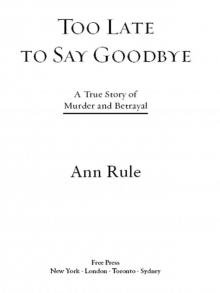 Too Late to Say Goodbye: A True Story of Murder and Betrayal
Too Late to Say Goodbye: A True Story of Murder and Betrayal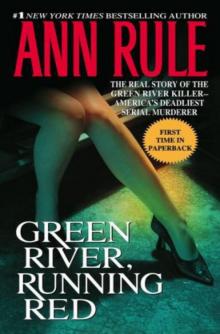 Green River, Running Red
Green River, Running Red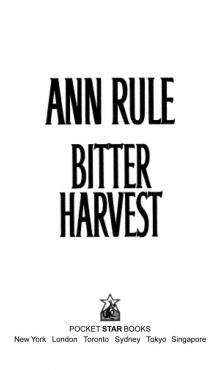 Bitter Harvest
Bitter Harvest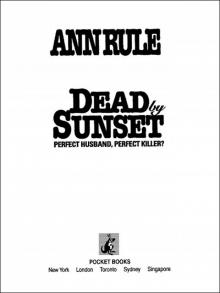 Dead by Sunset: Perfect Husband, Perfect Killer?
Dead by Sunset: Perfect Husband, Perfect Killer?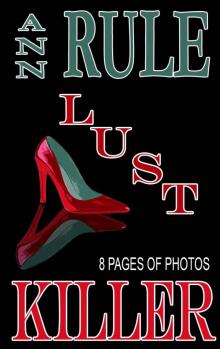 Lust Killer
Lust Killer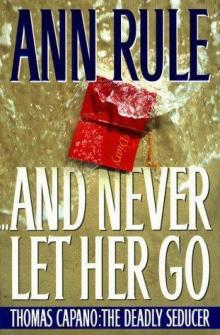 And Never Let Her Go: Thomas Capano: The Deadly Seducer
And Never Let Her Go: Thomas Capano: The Deadly Seducer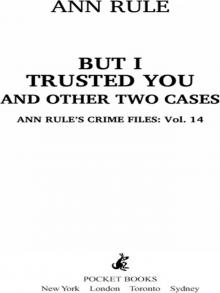 But I Trusted You and Other True Cases
But I Trusted You and Other True Cases Smoke, Mirrors, and Murder and Other True Cases
Smoke, Mirrors, and Murder and Other True Cases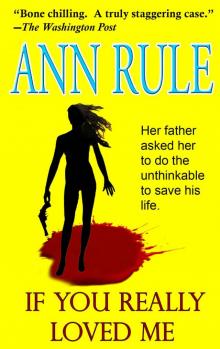 If You Really Loved Me
If You Really Loved Me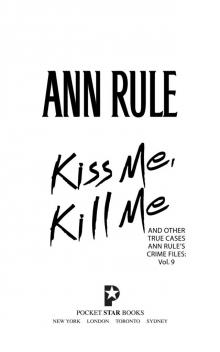 Kiss Me, Kill Me and Other True Cases
Kiss Me, Kill Me and Other True Cases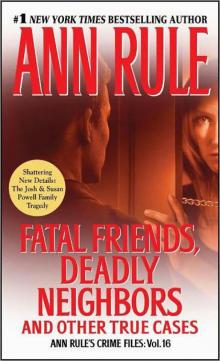 Fatal Friends, Deadly Neighbors and Other True Cases
Fatal Friends, Deadly Neighbors and Other True Cases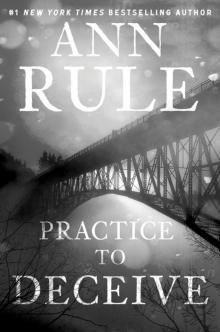 Practice to Deceive
Practice to Deceive Mortal Danger and Other True Cases
Mortal Danger and Other True Cases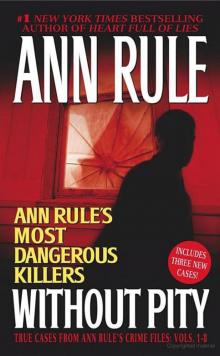 Without Pity: Ann Rule's Most Dangerous Killers
Without Pity: Ann Rule's Most Dangerous Killers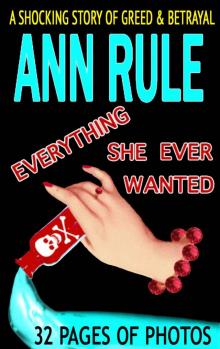 Everything She Ever Wanted
Everything She Ever Wanted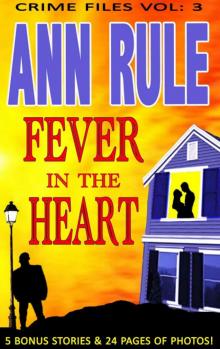 A Fever in the Heart and Other True Cases
A Fever in the Heart and Other True Cases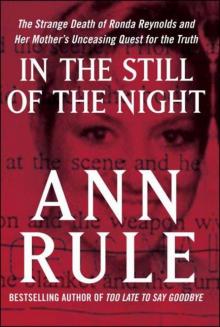 In the Still of the Night
In the Still of the Night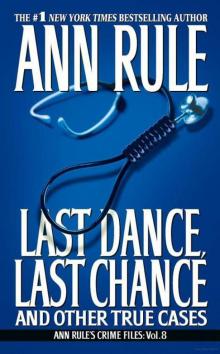 LAST DANCE, LAST CHANCE - and Other True Cases
LAST DANCE, LAST CHANCE - and Other True Cases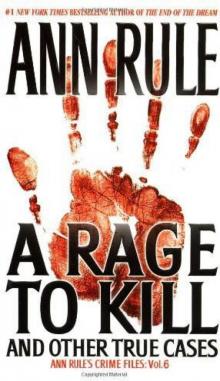 A Rage to Kill
A Rage to Kill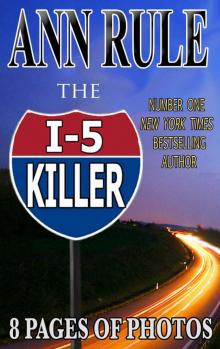 The I-5 Killer
The I-5 Killer The Stranger Beside Me
The Stranger Beside Me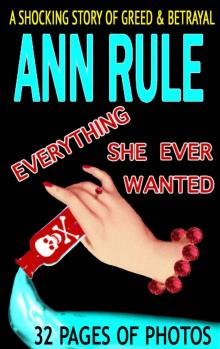 Everything She Ever Wanted: A True Story of Obsessive Love, Murder, and Betrayal
Everything She Ever Wanted: A True Story of Obsessive Love, Murder, and Betrayal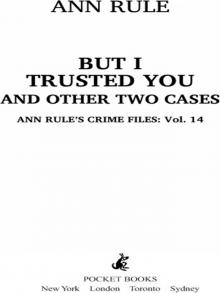 But I Trusted You
But I Trusted You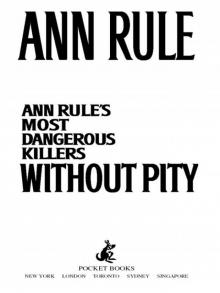 Without Pity
Without Pity Kiss Me, Kill Me
Kiss Me, Kill Me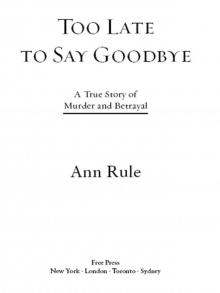 Too Late to Say Goodbye
Too Late to Say Goodbye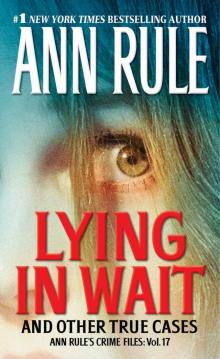 Lying in Wait
Lying in Wait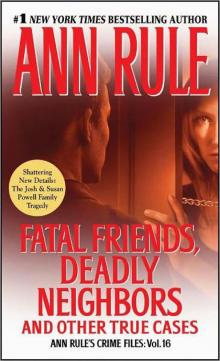 Fatal Friends, Deadly Neighbors
Fatal Friends, Deadly Neighbors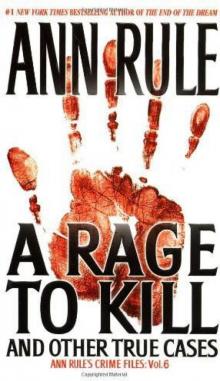 A Rage to Kill: And Other True Cases
A Rage to Kill: And Other True Cases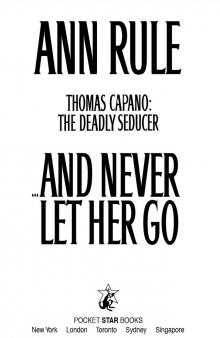 And Never Let Her Go
And Never Let Her Go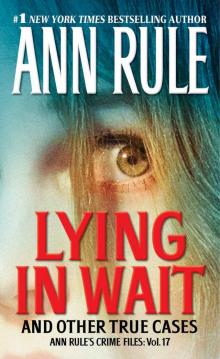 Lying in Wait Ann Rule's Crime Files Vol.17
Lying in Wait Ann Rule's Crime Files Vol.17 Blood Secrets: Chronicles of a Crime Scene Reconstructionist
Blood Secrets: Chronicles of a Crime Scene Reconstructionist No Regrets
No Regrets Mortal Danger
Mortal Danger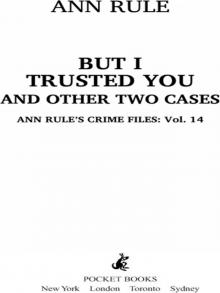 But I Trusted You: Ann Rule's Crime Files #14
But I Trusted You: Ann Rule's Crime Files #14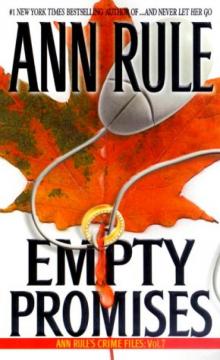 Empty Promises
Empty Promises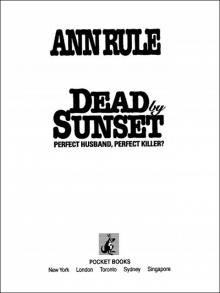 Dead by Sunset
Dead by Sunset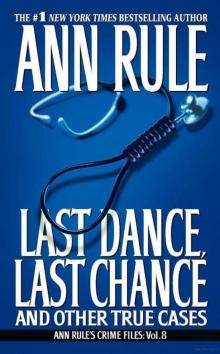 Last Dance, Last Chance
Last Dance, Last Chance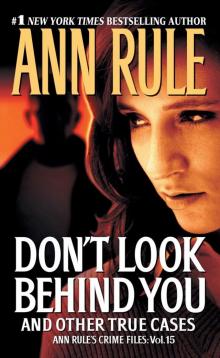 Don't Look Behind You
Don't Look Behind You